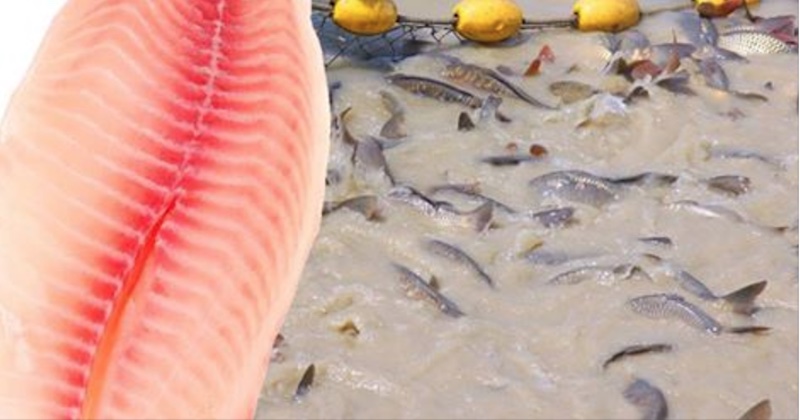Why You Should Never Eat Tilapia That Is Farm-Bred
Last updated on
Fish without a doubt is one of the healthiest forms of protein that is available to us. It is usually lean and contains many healthy nutrients including Omega-3 fatty acids. In this article, we are going to discuss one particular fish which is Tilapia. Tilapia is the most popular farmed fish in the United States and it has been under a lot of scrutiny for some time now due to the many studies that have been conducted that are meant to evaluate the effect that farm-bred tilapia in China has, on both the environment and consumers’ health.

The real problem with tilapia comes from the way it is being cultivated. The majority of tilapia that is eaten today is farm-bred instead of wild. It’s incredibly difficult to come across wild tilapia on the market. Even most restaurants serve farm-bred tilapia.
While wild tilapia eat lake plants and algae, farm-bred tilapia isn’t fed those same natural ingredients. Healthy fish oil in wild tilapia is basically lacking, in farm-bred ones. In fact, it is pretty hard to find any health benefits in the consumption of farm-bred tilapia.
Why You Should Never Eat Tilapia That Is Farm Bread

1. Inflammation
Many studies have confirmed that eating farm-bred tilapia can cause inflammation. It can also worsen already existing inflammation caused by a number of health issues such as asthma, heart disease, and arthritis. People often believe that the omega-3 fatty acid found in fish oil will reduce their risk of heart attacks, but in reality tilapia puts you more at risk to develop heart disease than bacon or hamburgers.
2. Cancer-Causing Pollutants
Most farm-raised fish are exposed to cancerous pollutants and chemicals a lot more than wild fish are. Drugs such as nitrofuran and dyes such as malachite green are known carcinogens, and traces of each substance have been found in farm fish on multiple occasions.
3. Higher Pesticides and Antibiotics
Farm-bred fish generally contain higher levels of pesticides and antibiotics. This is because farm fish are bred in a tightly packed crowd, which makes them more susceptible to diseases that are spread by other fish. This is why they are given so many antibiotics. The fish are also exposed to pesticides in order to kill off sea lice. These pesticides also have an impact on the environment as they can be released into the sea, which poisons other marine life.
4. Low Omega-3 to Omega-6 Ratios
Farm-raised tilapia don’t have the same amount of healthy nutrients like the ones found in the wild. The ratio of omega-6 to omega-3 fatty acids is 11 to 1, making the omega fatty acids in farm-bred tilapia not as beneficial for us as the ones in wild tilapia. Over-consumption of omega-6 fatty acids makes us more prone to inflammation. This imbalance of omega-6 to omega-3 fatty acids causes the food to have a negative impact on our bodies.
5. High Dioxin Content
High levels of dioxin can also be found in most farm-bred fish. Even short-term exposure to dioxin can cause skin lesions and negatively affect the function of your liver. Long-term exposure to dioxin has been shown to impair the immune system, nervous system, endocrine system, and reproductive functions as well. Chronic exposure to dioxin has resulted in several types of cancer.
Overall, it’s important to know that farm-bred tilapia does not have the healthy nutrients that your body requires. Try and eat healthier varieties of fish or try and eat wild tilapia, if you can find them.
References:
Tilapia popularity: https://www.nytimes.com/2011/05/02/science/earth/02tilapia.html
Tilapia farming studies: https://www.sustainablefish.org/aquaculture-improvement/tilapia-aquaculture-improvement-partnership
Carcinogenic pollutants: https://www.npr.org/sections/thesalt/2011/11/10/142220310/farmed-tilapia-with-a-dash-of-antibiotic
Pesticides and antibiotics: https://www.farmedanddangerous.org/salmon-farming-problems/environmental-impacts/
Omega-3 to Omega-6 ratio: https://www.wakehealth.edu/News-Releases/2008/Wake_Forest_Researchers_Say_Popular_Fish_Contains_Potentially_Dangerous_Fatty_Acid_Combination.htm
Dioxin levels in farm-bred fish: https://www.ncbi.nlm.nih.gov/pubmed/22959899
Exposure to dioxins: https://www.who.int/mediacentre/factsheets/fs225/en/
Some of the links I post on this site are affiliate links. If you go through them to make a purchase, I will earn a small commission (at no additional cost to you). However, note that I’m recommending these products because of their quality and that I have good experience using them, not because of the commission to be made.
































 JOIN OVER
JOIN OVER
Comments